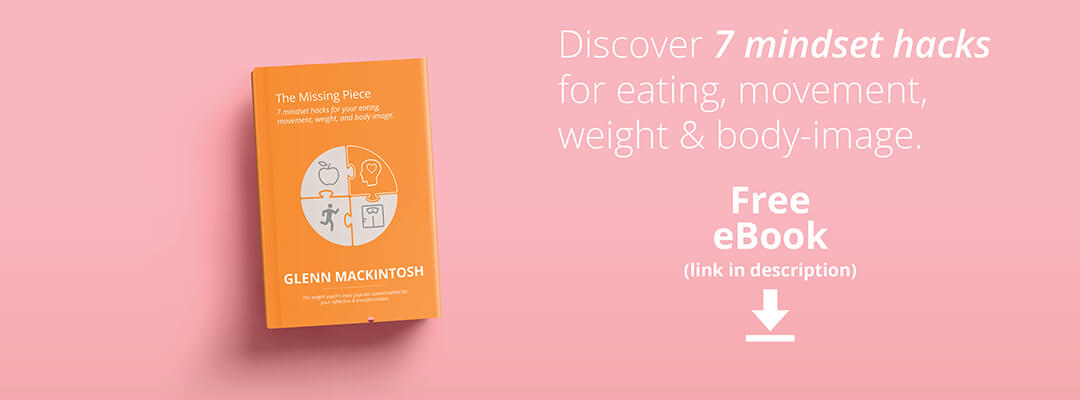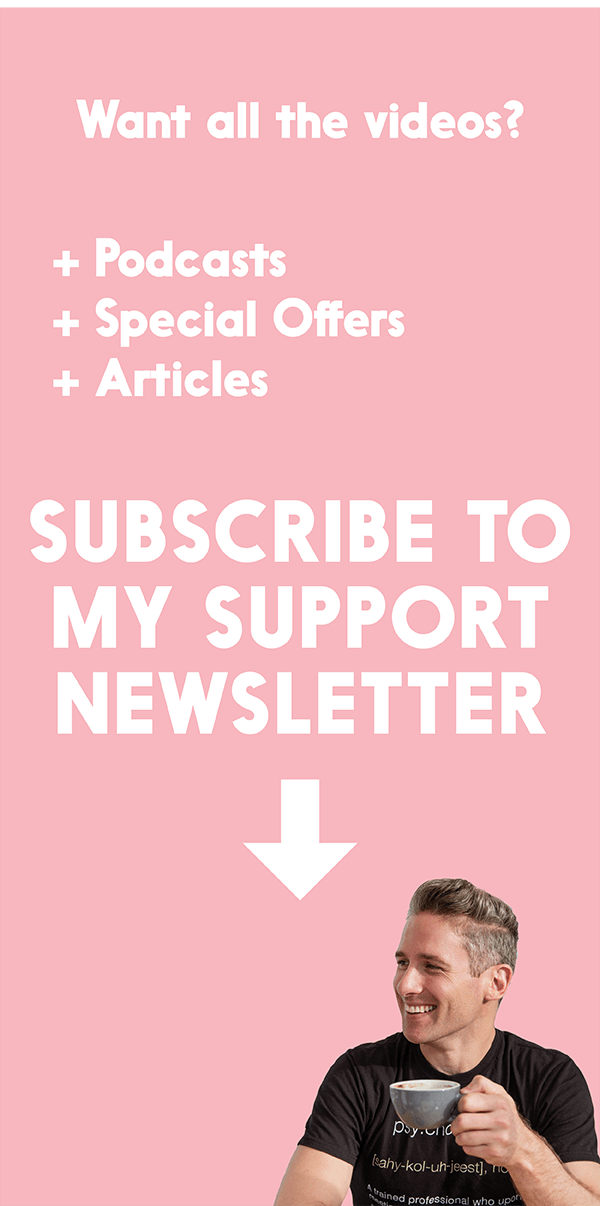
Whether we like it or not, setbacks ARE a big part of life. Falling down is normal, natural, and to be expected…it’s if, when, and how you get up that makes all the difference in the end. In this Thursday Therapy Glenn gives you his three best ways to handle failure with self-compassion, resilience, and a GROWTH mindset…it’s well worth the watch!
Watch Video
I created this video for people just like you.
If you found it valuable, please help me share it with them!
LINKS FROM VIDEO
Read Glenn’s Women’s Health Article: http://bit.ly/2ueG2Ko
For Reflection on Setbacks Diary: http://bit.ly/2pyFsRV
Example Reflection on Setbacks Diary: http://bit.ly/2pxrJe9
SHOW NOTES
- Viewer question on how to handle failure. [02:50]
- Using self-compassion to deal with failure. [03:23]
- Activity: Self-Compassion Exercise. [04:10]
- On Kristin Neff – world-leading expert on learning to develop self-compassion. [04:39]
- “Fall Down Seven Times, Rise Eight” Japanese Proverb. [04:55]
- No failure, only learning. [07:51]
- On Thomas Edison creating the commercially successful lightbulb. [08:09]
- Activity: Reflection on setbacks journal. [09:02]
- Parting thoughts on setbacks. [11:09]
TRANSCRIPT
Welcome to Thursday Therapy. I’m Glenn Macintosh, the white Si and today we’re going to show you how to fail like a winner.
Welcome to Thursday Therapy where I answer your questions on the psychology of eating, physical activity, weight, and body image every two weeks. I hope you’re doing well. We are too, in fact we are always doing well recently. The coolest thing to happen to us of late is that I did an interview for Women’s Health Magazine, so the journalists called me up and said, “Glenn I’m doing this article on how to lose the last five kilos. We’ve got a dietician, we’ve got a personal trainer, do you wanna do the mindset stuff?”
And I said, “I don’t know if you’re gonna want to print what I’ve got to say about losing the last five kilos, ’cause there’s a whole bunch of people that I see, who take great care of themselves. They eat well, they exercise regularly and if that last five kilos doesn’t wanna shift, I say to them, don’t worry about it, just focus on more important stuff and live your life.”
So I said this to the journalist and to her credit, she printed it. This is really, really exciting because we’re starting to see these non dieting messages starting to make it into the mainstream, so we’ll provide a link to our website where you can check out that article if you want to. But for now, let’s get to answering today’s question which is a funny one. It came through via text message, and I don’t know who it’s from, but it’s a really, really good one, and I think it applies to all of us.
The question is, how can someone handle failure? I love this question because none of us like it, but the reality is whether our aim is to become healthier, we’ve got some other goal or it’s just life in general, we all fail from time to time. So I’m gonna give you my three best ideas on how to fail like a winner. We’re gonna apply them specifically for people who are trying to improve their health but they can really apply to absolutely any failure.
No one likes setbacks. They’re hard times, but you don’t wanna give yourself a hard time, because you’re having a hard time. Instead, you wanna treat yourself with the same kindness and concern and caring that you would treat a good friend or maybe even a stranger. So this is what we call self compassion. And if you can learn to treat yourself with the same compassion that you often extend to other people ’cause a lot of us, we’re too hard on ourselves and much harder on ourselves than we are on others. If you can include yourself in your circle of self compassion, then you’re gonna go through your health transformation with a weight lifted off your shoulders before you even lose a kilo.
As a good exercise in self compassion, you can ask yourself, if a good friend was going through this exact setback that I’m going through right now, how would I treat them? What would I say to them, what would I encourage them to do? Would I be judgmental or understanding? And that might give you some clues as to how to develop compassion for yourself in that situation. So I’d like you to do that as a little exercise. If you wanna check out more about self compassion, we’re gonna provide some links to the work of Kristin Neff, who is a world leader and is absolutely amazing. She’s got some really cool free resources and also some programmes that can help you learn to develop self compassion.
One of my favourite Japanese proverbs translates to, fall seven times, get up eight. And it implores us to develop a mindset of resilience. Now this mindset applies so well to health behaviour, because the process of learning new behaviours by definition involves setback and failure. It’s not a matter of, if it will happen, it will happen, so we need to learn how to respond to it. A good example that I often think of is a baby going from its stomach to learning to crawl through to learning to stand. The falling process is part of the process. We would never expect a baby to get on its hands and knees and start crawling without falling and we’d never expect it to go from crawling to standing without falling. The ups and downs are just part of the process.
A way that I like to think about it with health behaviour change is that we’re kind of taught by the dieting industry that change happens like this. Here’s my old habits then I just change and there’s my new habits, hey presto! Right? But you and I and about a forest of research studies show that no behaviour change actually works that way. You start off with your old habits and then you move to creating some new habits and then your dog dies and you forget about everything for two months and then you go back. And then you pick yourself back up and you go again and you spend a little bit more time in your new habits and then you have a really tough period at work and then you go back.
And every time you go back, you kinda feel like you’re at square one. But you’re not actually at square one, because you’re developing some more familiarity with these new behaviours, even if you still revert back to the old habit for a while. This is not dissimilar to a baby learning to stand and falling down, but just getting a bit more familiar at standing for a longer period of time. And then after a while, you end up spending more time in this kind of middle ground and you can move from there. Now human beings, we are so fantastic at forgetting our past progress, so even if you’re in this middle ground with your new behaviours, and you’re making progress towards your eventual behaviours, you’ll flip back and you’ll still feel like you’re at square one.
And so the important thing to realise is, even if you do feel like you’re at square one, if you’re spending more time in those new behaviours, you’re probably actually not. And over time, if you just keep on becoming more and more familiar, spending more and more time in these new behaviours, you’re gonna end up with a whole new set of habits.
Failure can be such a loaded word. It’s more critical than compassionate, it kinda suggests that your failure is permanent rather than temporary and it sets you up for a defeatist mindset, rather than a mindset of growth. One of my favourite stories, and you might have heard this before, is of Thomas Edison when he was trying to create the world’s first commercially viable light bulb. And he failed about a 1000 times reportedly, and a reporter asked him, what is it like to fail a 1000 times? And he said, I haven’t failed a 1000 times, I haven’t even failed one time, I’ve figured out a 1000 ways not to make the light bulb. After I’ve eliminated all of the ways not to make the light bulb, I will find the way that works.
So what I want us to do is all take a leaf out of Edison’s book and view any failures, any failures that you have, not as signs that you won’t succeed, but opportunities to learn how you will. To help you do this, I’m gonna go through a little reflection on setbacks, good, better, how journal and we’ll provide a link to this on the website, so you can do it yourself.
So what we’ve got here is a little reflection on setbacks example. And we’re gonna go through it so you know exactly how to do it yourself. We call this technique a good, better, how. And we start off with the good. So even if you’ve really fallen flat on your face, there’s always some good that we can pull from it. So in this example, the person’s setback was they ordered two pizzas. But when they looked at the good, they previously used to order three pizzas plus a dessert. So even in that setback, the good news was that they had a whole less pizza and no dessert. The next part is for the part that comes really easily.
That’s the what you can do better. That’s the stuff that your mind beats you up about incessantly. So you often know that part. So this person decided that look what I can do better is that, Thursday nights I get really stuck for the food options. I just get tired, there’s no fresh food left from the previous Friday shop and so I’ve got no options that are prepared in advance. So that’s the thing the person could do better. I need to sort of figure out a way to prepare something in advance.
the next part is the how. This is the part that we often kind of forget about. And this is the part that really helps you learn from your setbacks, how am I gonna do things differently in the future? So this person said, I’m gonna make sure that I shop and I’ve got frozen salmon and veggies in the fridge for Thursday night. So I’m gonna do this every week with my shopping and I’m always gonna be prepared. The cool thing with this one is, once you’ve kinda done the good, better, how, you can just tear off that lesson and symbolically throw away the setback and just be left with the learning.
So if you’re going through a setback right now, I want you to be kind to yourself. Find a way to get back on your feet and make sure that you learn the lesson from your experience so you can keep moving forward. If you learn to fail like a winner and I really mean this, you’re failures stop becoming the life sentences that they once were, and just become opportunities for you to learn and grow and develop as a person. So have a resilient couple of weeks until I see you next. Of course, if you like this, let us know. If you’ve got any comments with your own experience, let us know and if you haven’t subscribed, please subscribe and I’ll you at next Thursday Therapy.





